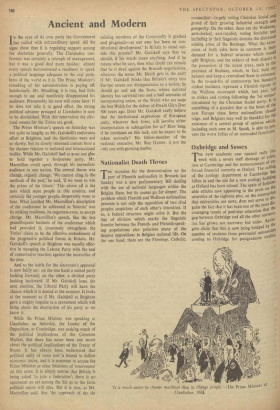Nationalist Death Throes
TILE occasion for the demonstration on the part of Flemish nationalists in Brussels last Sunday was a new parliamentary Bill dealing with the use of national languages within the Belgian State, but its causes go far deeper. The problem which Flemish and Walloon nationalism presents is not only the opposition of two rival peoples suspicious of each other's intentions. If so, a federal structure might solve it. But the line of division which marks the linguistic frontier between the French- and Flemish-speak- ing populations also polarises many of the deepest oppositions in Belgian national life. On the nne hand, there are the Flemings. Catholic. monarchist—largely voting Christian Social and proud of their growing industrial strength and prosperity. On the other, there are the Walloons, anti-clerical, anti-royalist, voting Socialist and including in their linguistic domain the distressed mining areas of the Borinage. What the extre- mists of both sides have in common is their demand for a federal structure which would split Belgium, and the subject of their dispute Is the possession of the mixed areas, such as the province of Brabant, which, in fact, hold the balance and keep a centralised State in existence. In the to-and-fro of controversy last SundaYV violent incidents represent a Flemish riposte tO the Walloon movement which, last year. led to strikes and rioting following the 'lei unique. introduced by the Christian Social party. It Is something of a paradox that at the heart of the new Europe these fierce nationalisms should reign, and Belgians may well be thankful for the existence of a central group of opinion which' including such men as M. Spaak, is able to IN' vent the worst follies of an outmoded fanaticism.














































 Previous page
Previous page